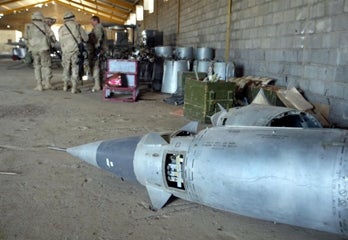From ABC’s new TV series Last Resort to the Fallout video-game series, scenarios in which weapons of mass destruction (WMDs) are employed against the U.S. homeland are a mainstay in popular culture.
It is a nightmarish scenario, however, and one for which we would expect our military to plan and prepare. Former Assistant Secretary of Defense for Homeland Defense Paul McHale explained in a recent Heritage Special Report that, regrettably, the Department of Defense’s preparedness in homeland defense and civil support missions is currently lagging behind.
McHale reinforced the importance of the Department of Defense creating and maintaining adequate response teams to address chemical, biological, radiological, nuclear and explosive (CBRNE) incidents at a national security conference last week, as reported by Quin Hillyer. The conference, held in Colorado Springs and cosponsored by Heritage and El Pomar Foundation, focused on the future of the U.S. military.
At the conference, Hillyer writes, McHale recounted that the Bush Administration initially called for the creation of three teams capable of responding to these types of disasters either independently or in combination with each other. These forces would be maintained under the U.S. Northern Command (NORTHCOM), which is responsible for homeland defense and support of civil authorities. Of those teams, two were operational by the end of the Bush Administration.
Nonetheless, the Obama team dropped two of the three teams, ignoring the advice from the Quadrennial Defense Review (QDR) that reinforced their importance. This decision leaves the military underprepared to respond if a catastrophe occurs.
As McHale has explained, “In short, from an operational perspective, NORTHCOM emerged from the QDR as a hollow force, with the QDR deliberations having terminated two-thirds of its CBRNE response capability.” This hollow force will be unprepared to respond to the worst-case scenarios involving the use of a WMD in the homeland.
Central among McHale’s recommendations at the conference is to elevate homeland defense and civil support to a first-tier priority within the Department of Defense. Indeed, he reinforced this important point at the conference, saying, “These are missions that only the U.S. military can achieve in response to a truly catastrophic threat. Untrained, general-utility forces’ responses will be too slow, and lives will be lost.”
Lack of proper governmental response in a catastrophic scenario might yield great TV, but in real life, it would make a bad situation worse.
